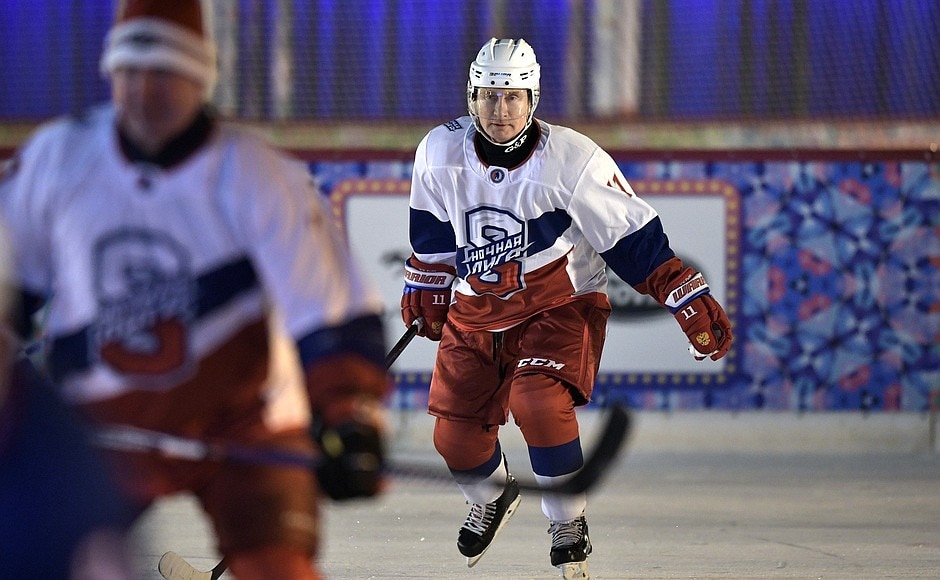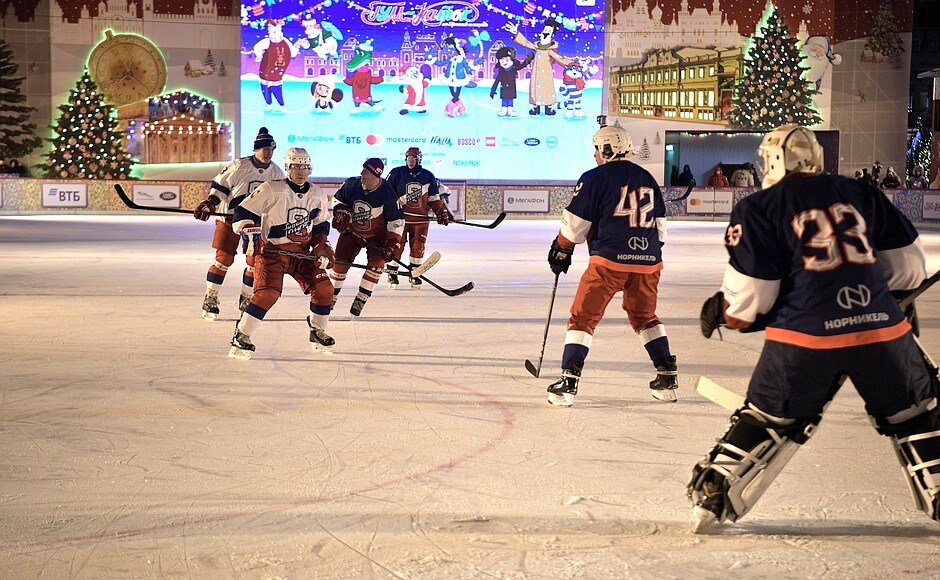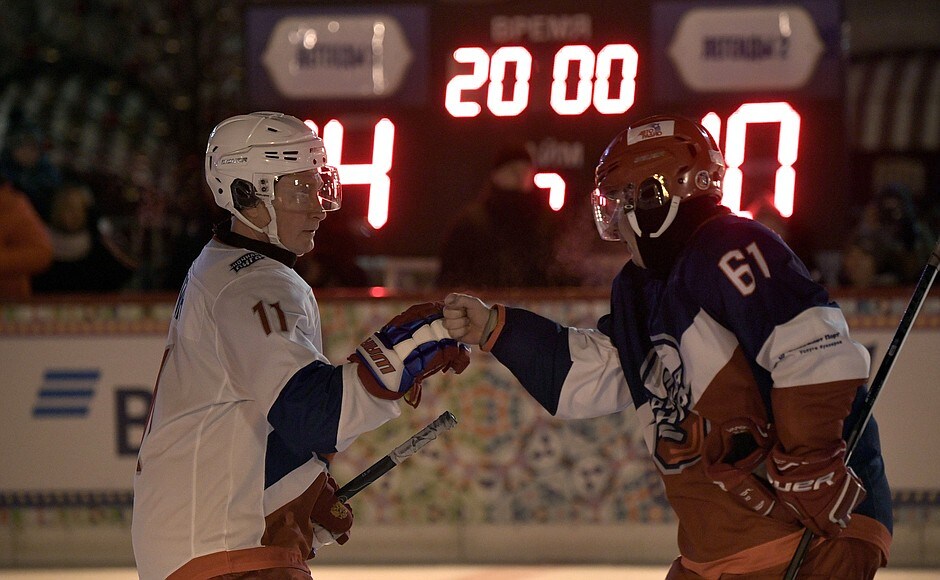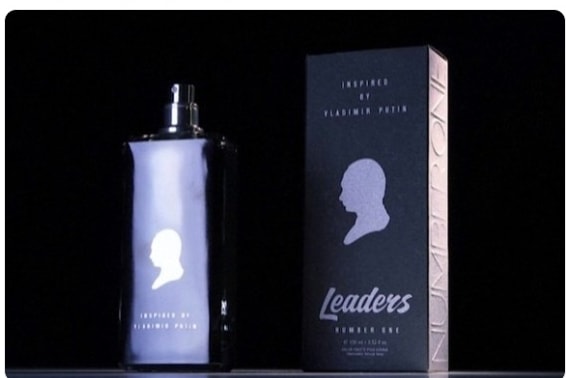Russia This Week is a weekly review by the MEMRI Russian Media Studies Project, covering the latest Russia-related news and analysis from media in Russia, the Caucasus, Central Asia, and Eastern Europe.
Photo Of The Week

Russian President Vladimir Putin congratulated Orthodox Christians, and all Russian citizens celebrating Christmas (Source: Kremlin.ru, January 7, 2019)
Putin's New Year's Address To The Nation

(Source: Kremlin.ru)
Below are excerpts from Russian President Vladimir Putin's New Year's Address to the Nation:
"… We face many pressing tasks in the economy, research, technology, healthcare, education and culture. What matters the most is that we make steady progress in improving the wellbeing and quality of life in Russia, so that all its people, each and every one of us, feel the change for the better as soon as next year.
"We will succeed, but only if we are able to work together. We never had any help in these endeavors, and never will. For this reason, we must form a team that is united, strong and acts as a single whole. Let the friendship and good hopes that bring all of us together accompany us moving forward and help us in our work and in achieving our common goals…
"From all my heart I wish joy and wellbeing to you, and success and prosperity to our homeland, to our beloved Russia.
"Happy New Year 2019!"
(Kremlin.ru, December 31, 2018)
In The News
- Putin's Traditional Meeting With Government Members Ahead Of The New Year: Starting In 2019, The Russian Army Will Receive The New Avangard Intercontinental Strategic System
- Russia-US Relations; Senator Kosachev: The West Failed to Contain Russia In 2018; Putin Sent His Best Wishes To Trump On The Occasion Of Christmas And New Year Holidays
- The Main Outcome Of 2018 For Russian FM Lavrov: European Countries Are Not Independent And Follow The US Even In Those Cases When It Contradicts Their Interests
- Op-Ed Of The Week - Former Russian FM Ivanov: The US Represents The Greatest International Problem Of 2019
- Night Hockey League Friendly Match
- Strange But True; Scent Of Vladimir Putin
- News In Brief: Ukraine-Russia Relations
Putin's Traditional Meeting With Government Members Ahead Of The New Year: Starting In 2019, The Russian Army Will Receive The New Avangard Intercontinental Strategic System

(Source: Rt.com)
During the traditional meeting with government members ahead of the New Year, Putin discussed new types of Russian weapons, focusing on hypersonic weapons.
Putin: "As you know, I mentioned new types of Russian weapons, mostly hypersonic weapons, in my Address to the Federal Assembly.
"The Avangard intercontinental hypersonic glide vehicle is one of them.
"As per my instructions, a Defense Ministry enterprise prepared and conducted the final test of this system. This test has just proved to be an unqualified success.
"All of the system's specifications and its performance have been confirmed. I repeat, the test was a success.
"Starting in 2019, the Russian army will receive the new Avangard intercontinental strategic system.
"The first Avangard regiment will be deployed as part of the Strategic Missile Forces.
"This is a major event in the life of the Armed Forces and probably the entire country. Russia now has a new strategic weapons system…
"In view of this latest achievement in the defense sector, I would like to thank all those who contributed to this outcome in the Government, including the Finance Ministry and the Industry and Trade Ministry. This was a major effort, and of course, I cannot fail to recognize those who were at the origins of this work.
"I have no doubt that those who started this work back in 2003 will see or hear this. This was a lengthy period. It is a major development for science, as it is for the defense industry and in terms of enhancing the country's defense capability.
"From a broader perspective, this event is much more than a national achievement. It goes beyond national interests. This is a serious event. We are the first to have a strategic weapon of a new kind, enabling us to provide for the effective defense of our state and people for decades to come…"
(Kremlin.ru, December 26, 2018)
Russia-US Relations
Senator Kosachev: The West Failed to Contain Russia In 2018
The Chairman of the Russian Federation Council's Foreign Affairs Committee, Konstantin Kosachev, said: "I sincerely believe that the outgoing year's key outcome is the failure by the West to stifle Russia's development. Undoubtedly, 2018 turned out to be the pinnacle year in sanctions pressure on our country. This situation had been building up throughout all the previous years. But I would like to believe that this peak is behind us due to the simple reason that our Western opponents' steps against Russia have failed to yield any result…
"The outstanding results of Russian presidential election this March are a strong response to those schemes and designs, which were part of the sanctions pressure policy against Russia…
"In the end, I hope that sooner or later the Americans' actions, which are guided by their own rather than collective interests, will leave them in isolation and they won't get the total support of (their) allies like in the previous years and decades. This is what I expect in 2019."
(Tass.com, December 28, 2018)
Putin Sent His Best Wishes To Trump On The Occasion Of The Christmas And New Year Holidays
"Russian President Vladimir Putin has sent his best wishes to US President Donald Trump on the occasion of Christmas and New Year holidays, the Kremlin press service informed.
"In his message, Putin stressed that 'Russian-US relations are a key factor of ensuring strategic stability and international security'. The Russian leader also confirmed Russia's readiness for dialogue with the US on a wide range of issues.
"Putin also sent best wishes to former US President George W Bush."
(Tass.com, December 30, 2018)
The Main Takeaway Of 2018 For Russian FM Lavrov: European Countries Are Not Independent And Follow The US Even In Those Cases When It Contradicts Their Interests
On December 30, Russian FM Sergey Lavrov gave an interview summarizing the highlights of 2018 in Russia's foreign policy.
Lavrov: "Probably there is no need to mention that this was a difficult year. As well as the fact that Russia is under constant pressing by those who consider it a rival for some leading position in world politics. We see an example of this in the actions of the United States. They speak openly about the need to suppress Russia and China. They do not like Iran or North Korea either.
"Unfortunately, our European colleagues, whose independence we would like to see in their practical actions, are not too ready for this and follow the US even in those cases when it contradicts their interests. Let me give an example: voting regarding the Russian resolution in support of preservation of the Intermediate-Range Nuclear Forces Treaty (INF Treaty). We heard most concerns about the United States' decision to unilaterally withdraw from the treaty in Europe. But the entire European Union voted against our proposal, so that the INF Treaty would in fact cease to exist, and that US missiles, prohibited in accordance with the Treaty, would be deployed and this would threaten Europe once again. The next step, of course, will be counter measures by the Russian Federation. This is not our choice but they must understand in the EU capitals the threat this poses to the Europeans themselves. This is why it is impossible to explain their voting against our proposal by anything but misunderstood solidarity. This is just one of examples. It is the last of the expiring year's events, but a very demonstrative one."
(Mid.ru, December 30, 2018)
Op-Ed Of The Week - Former Russian FM Ivanov: The US Represents The Greatest International Problem Of 2019
Former Russian FM and Chair of the Russian think-tank RIAC, Igor Ivanov, wrote an op-ed, titled "Entering 2019: Challenges and Opportunities."
Below are excerpts of his op-ed:
"Reflecting on problems of 2018 and on challenges of 2019, it is tempting to point at the current US Administration as the greatest international problem of today. Indeed, over the outgoing year Washington has been very active in questioning the foundations of the contemporary world order. Pursuing its immediate goals, the United States does not seem to care much about international law or about multilateral institutions. It unilaterally withdraws from critically important agreements and tries to impose its unilateral decisions on other countries and on international organizations. In 2018, as well as in 2017, the White House did not hesitate to pressure its partners and opponents, which led to lower stability, higher risks and less predictability at the global and regional levels.
"However, in my view, it would be a dangerous oversimplification to blame all the problems in the world of 2018 on Donald Trump and the United States. The reality is much more complicated. These days, the world is going through a profound technological, economic, social and cultural transformation, and our final destination is not clear…
"So, how could we do better in 2019? First, we have to agree that the critical task of the day is the task to restore and to enhance the shattered global management. Without addressing this task, we are not going to succeed in any other undertakings. The central dividing line in the modern international system is not that between democracy and tyranny, but between order and chaos.
"The prime building blocks of the international system are and will continue to be nation states. Therefore, the principle of sovereignty should be fully adhered to and considered to be of paramount importance. Interdependence and integration can be accepted as long as they do not contradict the principle of sovereignty.
"Nevertheless, there are certain limits on what even the most powerful states can accomplish unilaterally. With globalization going on, these limits become more and more apparent — both in the area of social and economic development and in the area of international and even domestic security. Unfortunately, today we see many powerful countries creating more problems than offering solutions. The United States is arguably the most graphic example of explicitly unilateralist, shortsighted egotistic foreign policy decisions. Given the unique role of US in the modern international system, this obsession with unilateralism in Washington appears particularly dangerous.
"However, let me underscore once again — this is not about the United States only. All states — big and small, rich and poor, in the West and in the East — have to master their abilities to working together in the very condensed, crowded and interdependent world of today and of tomorrow. So far, none of us can convincingly claim that his or her country has fully learnt the uneasy art of multilateralism. We now see that even in the European Union — the recognized leader of multilateral diplomacy - multilateralism faces serious and diverse challenges. It would be better for all of us to study the art of multilateralism jointly, not in separation from each other. This might sound unrealistic under the current dire political circumstances, but I see no other way — neither for Europe, nor for the world at large. In the world of today, security is indivisible, and so is prosperity. The emerging international system should fully reflect the changing balance of powers in the world. The existing West-centered institutions should either undergo a profound transformation or be replaced by more universal, more inclusive and more representative organizations. We should fully reject the concept of Western (i.e. liberal) universalism of favor of developmental pluralism. The emerging concept of modernity should imply opportunities for preserving national traditions, culture, specific economic, social and cultural models distinctly different from the Western examples. At the same time, spontaneous market mechanisms, which set the rules for the global economic and financial systems today, should be complemented by appropriate regulatory frameworks.
"Looking forward into 2019, one can observe that the glass is half-full or half-empty. In the end of the day, the difference is in the attitude: the glass looks half-empty if you are trying to drain it; it is half-full when you keep filling it."
(Russiancouncil.ru, December 20, 2018)
Night Hockey League Friendly Match
On December 29, 2018, Putin took part in a Night Hockey League friendly match at a skating rink on Red Square. Defense Minister Sergei Shoigu and hockey veterans Alexei Kasatonov, Pavel Bure and Vyacheslav Fetisov, to name a few, took part in the match alongside the president.
(Kremlin.ru, December 29, 2018)

(Source: Kremlin.ru)

(Source: Kremlin.ru)

(Source: Kremlin.ru)

(Source: Kremlin.ru)
Strange But True
Scent Of Vladimir Putin

(Source: Vk.com/politics_today)
"A few years ago a Russian company gave both men and women the chance to smell like a world leader, and it offered them none other than President Vladimir Putin.
"Kremlin spokesman Dmitry Peskov said in a statement that the use of Vladimir Putin's name for commercial purposes, namely for the production of perfume, had not been approved by the president's administration."
"'Leaders Number One', a perfume dedicated to Putin, has notes of lemon, bergamot and blackcurrant, as well as cedar, pine, fir cones, musk, and mung beans. It was first issued in 2015, going on sale in Moscow's GUM department store, with a limited edition of 2,000 bottles. The cologne comes in a black bottle featuring the president's head, and the words 'Inspired by Vladimir Putin' in English, and costs 18,000 roubles (about $268) for 100ml."
(Sputniknews.com, January 6, 2019)
News In Brief:
Ukraine-Russia Relations
- Secretary of Russia's Security Council Nikolai Patrushev said the United States and Ukraine are using neo-Nazi and ultra-right forces in pursuing their own political interests. (Tass.com, December 26, 2018; read the full article)
- Patriarch Bartholomew signs tomos of autocephaly for a new Ukrainian church. (Interfax-religion.com, January 5, 2019; read the full article)





